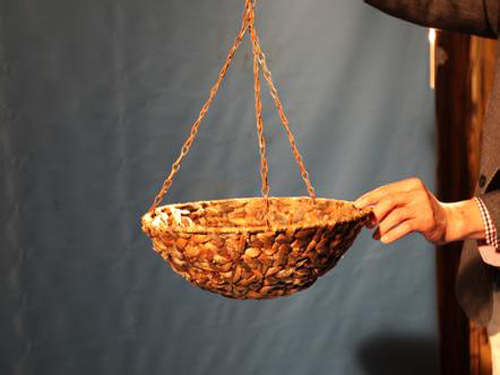Approaching Ghana's traditional weaving process
African people are numerous and clever. A piece of ordinary wood, stones, a few tree seeds, half an iron wire, or an abandoned beer can, once they are hands, can be fun and interesting artworks. People cleverly use everything that nature has endowed them, create life, and weave dreams. Viscose Fabric,Viscose Dress Fabric,Viscose Blend Fabric,Printed Viscose Fabric Shaoxing Yuantiao Imp&Exp.,Ltd. , https://www.jeesun-fabric.com
In Ghana West Africa, known as the "Gold Coast," people always marvel at the weaving crafts that can be seen everywhere on the streets. Handicraft makers roasted in the hot sun, fingers fluttering, sweating, using bamboo, rattan, wood, palm leaves, seaweed and other carefully woven furniture and supplies of various shapes, but also continued this traditional manual skills.
At the knitwear open-air market in the capital of Accra, you can find not only furniture, tables, sofas, coffee tables, wardrobes, beds, TV cabinets, dressers, etc., but also baskets, bags, shoes, belts and other daily necessities. You will find cute animal toys shaped by elephants, lions and chimpanzees.
Next to a wide array of woven furnishings, craftsmen are immersed in creating their own works. Polish the planks and sharpen the bamboo and rattan. They never stop. The bamboo strips shuttle back and forth between skilled fingers, and are then filled with canes, palms, and seagrass, gradually weaving tables and chairs and sofas. The sofa seats will be accompanied by local soft fabric cushions, and some will be made into a stylish round shape. They will sit comfortably and comfortably, and they seem to smell the nature.
This kind of woven furniture is expensive, and most of the ordinary consumers can only be discouraged. Due to the complexity of the production process, an ordinary bamboo chair costs 150 cypriots, equivalent to about 450 yuan.
The 33-year-old weaver, Samuel Minta, is a senior craftsman here and has been doing this for more than 10 years. He explained that the weaving process in Ghana has been popular since the colonial era and has now become an important brand to display national traditional culture, attracting many foreign customers to buy.
Mingta told reporters that he had been woven into a hobby since he was 10 years old and was determined to grow up as a weaving craftsman. “We just started knitting baskets. After a while, we all realized that we must use our brains to design different products based on our needs to open the market and develop for a long time. Since then, there have been so many different types of furniture.†Tower said.
For craftsmen, knitting is not only a way of expressing emotions, but also a means of making a living. The lean and capable Edmund Kumi has been engaged in the weaving process for just two years. Because of poverty at home, he had to withdraw from a craft school he was studying at. "This craft has given me a lot. I only have to work harder and sell more works to earn enough tuition and support my family."
Although the business is booming, the weaving process still faces development difficulties. Due to limited funds, weaving workers can only set up stalls and sell products along the main street. The Weaving Workers Association Yaw Bhumpeng told reporters that in the past 20 years, workers have not sold their handicrafts in fixed places and they have been forced to move around. This has affected the development of the weaving industry and the expansion of the knitwear market.
“The weaving process has provided employment for many young people. I hope that the government will provide them with a fixed place for them to feel secure in their employment and create more and better products instead of moving around. This will benefit the traditional knitting process in Ghana. Inheritance and social stability," said Pompon.